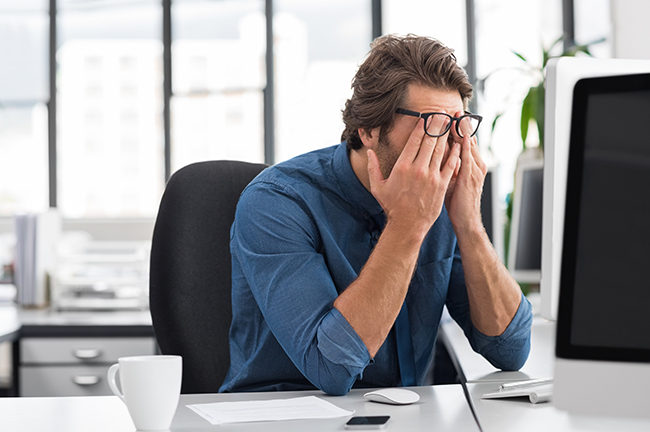Protect Your Eyes from Excessive Blue Light
Sunlight is the main source of blue light exposure, and being outdoors during the daytime is where we get most of our exposure to it. But there are also many man-made, indoor sources of blue light, including fluorescent and LED lighting and flat-screen televisions. The overabundance of bright artificial light can create a strain on your eyes.
Eye fatigue, dry eye, and headaches are symptoms of spending too much time in front of a digital screen. Look around. You probably work or live in an environment filled with fluorescent light and glare. You are staring at a computer screen or mobile device right now.

In this digital age, electronics are ingrained in our day to day lives. During the evening you are probably watching something on Netflix, YouTube, TV, doing homework, gaming, or just surfing the web. The devices that you are using to do this with emit a blue light wavelength similar to the day time sky. This blue light enters your eyes and can signal your brain to think it is still day time. Your brain uses this signal and can restrict the flow of melatonin through your body.
Melatonin, the sleep hormone, is naturally produced in our bodies. More so when our eyes are exposed to the nighttime darkness. In addition to helping us sleep better, melatonin also helps set our sleep-wake cycle allowing us to wake up naturally at about the same time each day without having to use an alarm clock.
While many people have heard that blue light from electronics may disrupt sleep, many do not know that about 25% of the blue light from fluorescent lighting and 35% from LED lights is also damaging to eye health. Excessive exposure over time may increase the risk of vision problems including macular degeneration.
.png)
The degeneration is pretty subtle and minimal, but some say that we may not know the full effects of the increased exposure for some time. Think of it like sunscreen and UV light. When I was a child, suncreen was much more of an afterthought than it is today. We now know more about the risks associated with increased UV exposure than we did 30 years ago.
This doesn’t mean that all blue light is bad for you! It turns out that some blue light exposure is essential for good health. Research has shown that high-energy visible light boosts alertness, helps memory and cognitive function, and elevates mood.
Blue Light Filters And Protective Eyewear
If you are constantly using your computer or mobile device for things like texting, e-mailing, gaming and web browsing, a convenient way to reduce your blue light exposure is to use a blue light filter.
These filters are available for smartphones, tablets, and computer screens and prevent significant amounts of blue light emitted from these devices from reaching your eyes without affecting the visibility of the display. Some are made with thin tempered glass that also protects your device’s screen from scratches.
Examples of blue light filters for digital devices include: iLLumiShield and Tech Armor Retinashield.
Another way to protect your eyes from blue light exposure is by the use of special computer glasses. These glasses are available without an prescription if you have no need for vision correction or if you routinely wear contact lenses. If you do require glasses in order to correct your vision, they can be specially prescribed for the distance from which you view your devices. There are also clip-on versions available as well.
Also, a number of lens manufacturers have introduced special glare-reducing anti-reflective coatings that also block blue light from both natural sunlight and digital devices. You also may want to consider photochromatic lenses, which provide seamless protection from UV and blue light both indoors and out and also automatically darken in response to UV rays outdoors to increase comfort and reduce glare.
Ask your eye doctor or optician about which type of vision correction and lens features best suit your needs for viewing your computer and other digital devices and protecting your eyes from blue light.





